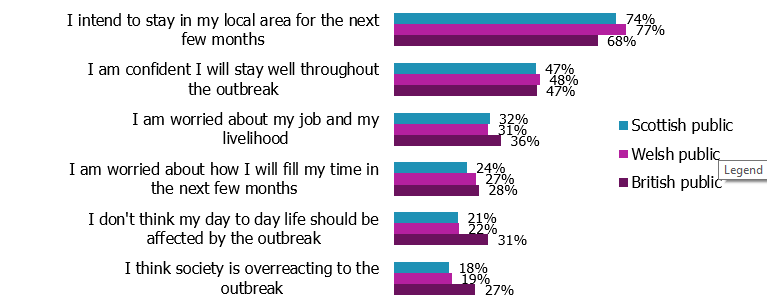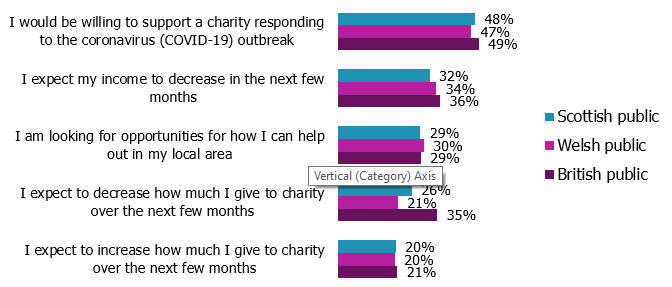Since the onset of COVID-19, there has been a great deal of variation in the ways the pandemic has been handled by governments throughout Britain. In this week’s blog we’re revealing some of the findings from our latest wave of research with the general public in Scotland and Wales, and looking at how attitudes compare to those of the British public as a whole. How have differing approaches to the tackling of COVID-19 affected public attitudes? Most importantly, what impact might this be having on perceptions of charities?
In July and August our annual Celtic Charity Awareness Monitor survey asked a representative sample of 1,000 members of the public in both Scotland and Wales about their attitudes towards government, the personal impact of restrictions, and their charitable giving behaviours. In August we also asked the same questions to a representative sample of 1,000 members the British public in our quarterly Charity Awareness Monitor survey.
When we compare the results of these surveys, we notice some clear differences in attitudes. Here’s our key pick of the findings and some thoughts about the impact on charities and society as a whole:
Scots are far and away the happiest with how their government has handled the outbreak
-
Our series of public polls on COVID-19 and charities have shown that the percentage saying they are pleased with how government is handling the outbreak has sharply declined from a peak of 51% in April, down to just 35% in August following a slew of high-profile blunders and U-turns by Westminster.
-
By contrast, the picture in August in the devolved nations looked markedly different. 64% of the public in Scotland were pleased with how the Scottish Government was handling the outbreak, while 56% of the public in Wales were pleased with how the Welsh Government was doing.
Public in Scotland and Wales are less likely to think society is overreacting to the outbreak
-
We also notice some differences in attitudes when it comes to the personal impact of restrictions imposed as a result of COVID-19. The percentage of people saying they don’t think their day to day life should be affected by the outbreak is noticeably lower in Scotland (21%) and Wales (22%) compared to in Britain as a whole (31%).
-
Likewise, when asked whether society is overreacting to the outbreak, noticeably fewer people in Scotland (18%) and Wales (19%) think that this is the case compared to in Britain as a whole (27%).
-
All in all, approximately a third of people are concerned about their job and livelihood at the moment, but slightly less people are worried about this in Scotland (32%) and Wales (31%) compared to in Britain as a whole (36%).
Figure 1: Personal impact of the outbreak



“To what extent do you agree or disagree with the following statements in relation to the current outbreak of coronavirus (COVID-19)?” Strongly agree + Agree
Source: Celtic Charity Awareness Monitor, Jul/Aug 20, Base: 1,000 adults 16+, Scotland | Source: Celtic Charity Awareness Monitor, Jul/Aug-20, Base: 1,000 adults 16+, Wales | Source: Charity Awareness Monitor, Aug 20, Base: 1,000 adults 16+, Britain
Welsh least likely to decrease how much they give to charity over the coming months
-
When it comes to support for charities, broadly we see that half of the public in Scotland (48%), Wales (47%) and Britain as a whole (49%) say they would be willing to support a charity responding to the coronavirus outbreak.
-
Around 1 in 5 people in Scotland (20%), Wales (20%) and Britain (21%) say they expect to increase how much they give to charity over the next few months.
-
However, where we do see a difference is among those who say they expect to decrease how much they give to charity. While 35% of the British public say they expect to give less over the coming months, this falls to 26% in Scotland and further to 21% in Wales.
Figure 2: Charity giving during the outbreak


“To what extent do you agree or disagree with the following statements in relation to the current outbreak of coronavirus (COVID-19)?” Strongly agree + Agree
Source: Celtic Charity Awareness Monitor, Jul/Aug 20, Base: 1,000 adults 16+, Scotland | Source: Celtic Charity Awareness Monitor, Jul/Aug-20, Base: 1,000 adults 16+, Wales | Source: Charity Awareness Monitor, Aug 20, Base: 1,000 adults 16+, Britain
To sum up, there are noticeably higher levels of faith in the policy decisions and governing styles used to handle the coronavirus pandemic in Scotland and Wales compared to those employed by Westminster. We know that good governance is extremely important for a flourishing society and that bad governance erodes trust. It looks as though the differing approaches taken in Scotland, Wales and England are impacting people’s views of their own responsibilities during the pandemic. When we look at charities, our data shows that people value their response to the pandemic equally across the nations. However, when it comes to how much people feel they are able to give to charity at the moment, the public in Scotland and Wales are feeling less pessimistic about how their giving patterns will be altered by the pandemic.
Given that the title of the
Given that the title of the article is How have governments across the UK fared during the crisis?. Northern Ireland should have been included or the title should have been changed to read;How have governments across Britain fared during the crisis?
Hi Trevor. The title reads
Hi Trevor. The title reads "What do people in Scotland and Wales think about charities and the pandemic?" and I was careful to only mention Britain in the article, although I realise we may have made a mistake in our newsletter. We should definitely do some analysis of the situation in Northern Ireland soon, so thanks for bringing this to our attention - Rosie


